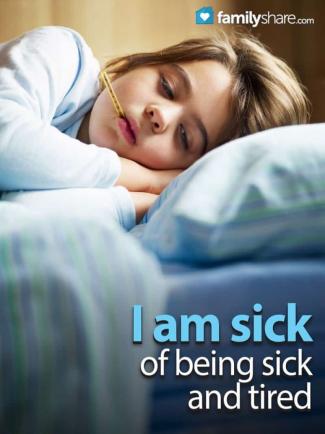
When my daughter contracted Mono when she was twelve, I was shocked. I thought mono was associated with being around the opposite sex - kissing! It turns out that a mononucleosis infection can be contracted at any age - and it has nothing to do with kissing. It's typically seen in young adults, but three years ago, I got it too, so it can affect anyone, at any age. And, it IS contagious, so be aware.
Infectious mononucleosis is caused by a virus
Just like with the cold virus, you can't take an antibiotic and have mono just go away. Treating the symptoms is the only thing you can do until mono goes aways on it's own. Mono is caused by the Epstein-Barr Virus, the same virus that produces chronic fatigue syndrome, and is a member of the herpesvirus family, according to MedicineNet.com.
Mono can be contracted through saliva
This is where it got the famous name, "Kissing Disease." However, if a child drinks out of the same cup as her friend, she can get it just as easily. If a member of your family has the disease, ensure they have their own cup - plastic is best so it can be thrown away. However, thoroughly washing a regular cup will work as well. This also applies to utensils.
The incubation period is 4 to 8 weeks
From the day you start the symptoms, mono can stay in your body upwards of 8 weeks and can be spread. Isolating anything that touches the mouth is key to not spreading the disease. Don't allow young children to kiss anyone on the cheek or put their fingers in their mouths.
Symptoms of mono include
-
Sore throat
-
Fever
-
Swollen lymph nodes
-
Fatigue
-
Malaise
-
Spleen Enlargement (sometimes)
-
Inflammation of liver (sometimes)
It's very important to not participate in any vigorous, contact sport while the virus is active and upon recovering. During this time a hit to the spleen (although rare) can cause it to rupture.
Most adults have an antibody against mono
Up to 95 percent of adults ages 35 to 40 carry a mono antibody in their blood. This means that at sometime in their life, they will or have already contracted the virus in the U.S. (Centers for Disease Control and Prevention) The immune system produces antibodies that attack the virus.
Approximately 10 percent of children get mono
Of these children, most do not have symptoms, meaning they could get it and never know. As adults, they will be protected. The typical age of contraction is around 15 to 24 years, hence, the "Kissing Disease." The peak ages are 15 to 17. In children, the virus is usually less severe than in adults.
Blood tests can confirm the virus
If the antibodies are detected in the blood, a specific blood test, called the mono-spot test, can confirm the diagnosis. The Heterophile antibody test, another reliable confirmation of the virus, relies on the immune system that produces antibodies to attack and destroy the virus.
Mono can't be prevented, but it can be stopped from spreading by using excellent hygiene skills and keeping the infected family member away from close contact. One thing to remember is that mono can be reactivated in an individual, so be aware of the signs and symptoms. Sometimes, there are no symptoms, so it can be difficult to completely avoid the virus.
If you or a member of your family contracts mono, the best things are rest, avoidance of sports, plenty of fluids, medications to treat the symptoms, as well as Vitamin C to boost your immune system. After recovery, take things slowly until full health is restored.

